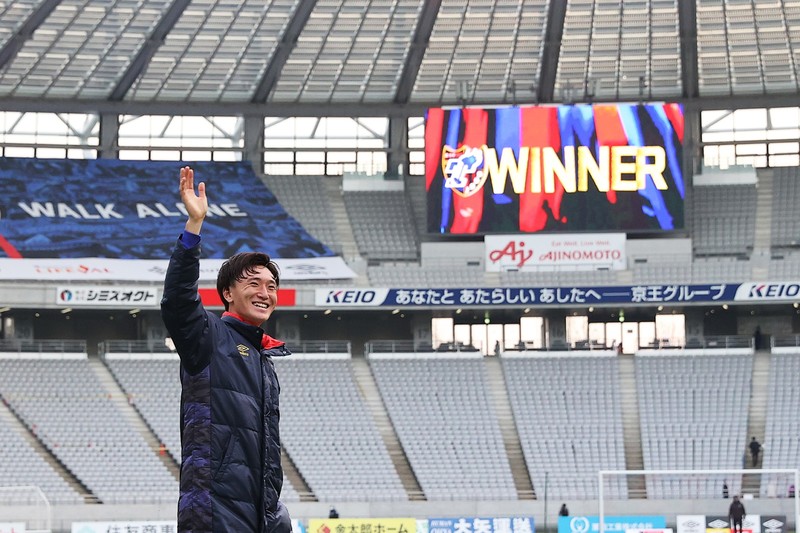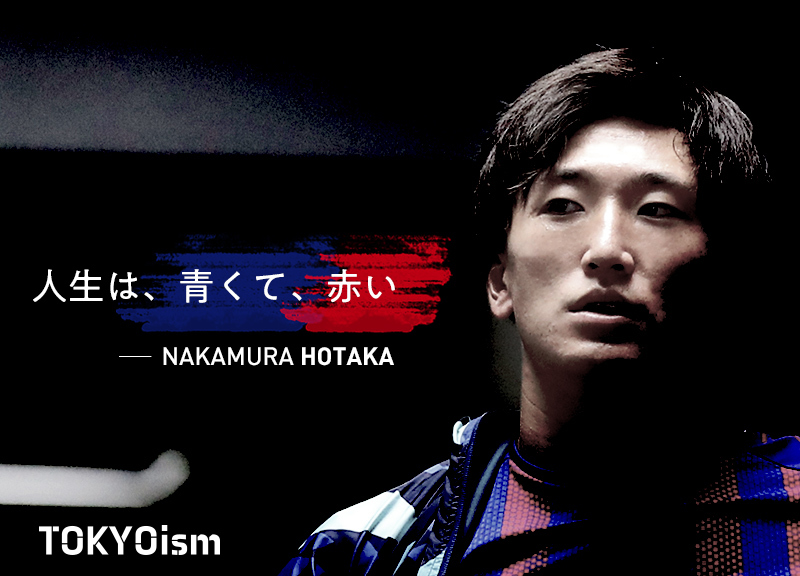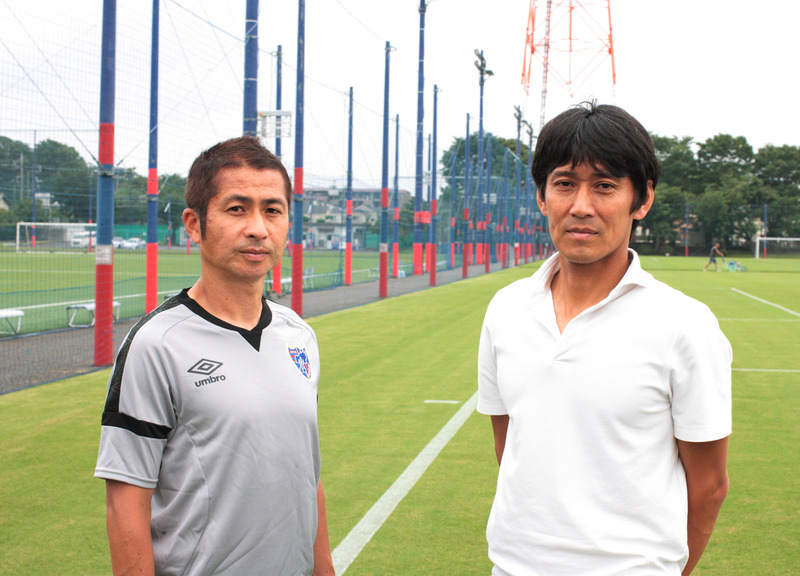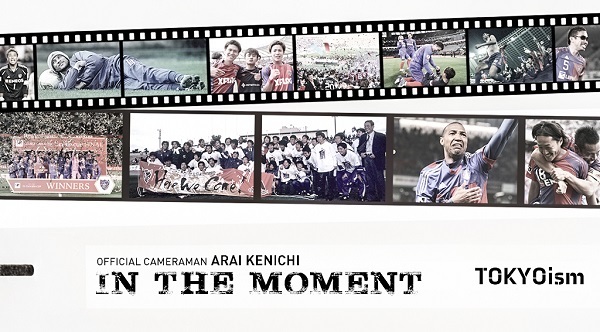Negative thinking and stubbornness seem to be two sides of the same coin. It is precisely because one delves deeply into things that they sometimes question themselves and become troubled. In contrast, those who live in a meandering way lack both the seriousness to ponder and the desire to pursue their true selves straightforwardly.
And experience makes a person greedy. Not in a bad way. For a professional, ambition is important. From my professional debut in February 2020 to winning the Levain Cup in January 2021, about 11 months. During this short period, my heart often became anxious, yet I was encouraged and motivated time and again.
Everything is about the human, Hotaka NAKAMURA.
I thought about quitting many times

A starting selection in the opening match that I had never even imagined. February 25, 2020, Shizuoka, Nihondaira. Before the COVID-19 pandemic, Nakamura stood on the grand stage filled with spectators.
"I was really the most surprised. To be honest, I felt like I had almost nothing I could do when I turned pro. I started from the very bottom at the Okinawa camp. I couldn't keep up with the speed of the professionals at all. However, towards the end of the camp, when I played left back for the first time in a practice match and managed to contain Ryo GERMAIN from Sendai, I think people's perceptions of me changed. Two days before the opening match, Kenta HASEGAWA (the coach) told me, 'You're starting on the left side.' But when I actually played, I didn't feel confident at all, and I just had the feeling that 'this is going to be bad...'."
From the beginning, he was a player who sparked great interest in his personality during our conversations. His statements are fundamentally grounded. He is also skilled at viewing himself objectively. He describes himself as someone who "thinks negatively, sees himself in a low light, and compares himself to those around him."
However, what's interesting is that when you listen to him, you can occasionally catch glimpses of his ruggedness, confidence, and determination, which are aspects of his strength. He remains calm yet passionate. Such emotional exchanges can also be sensed from Nakamura's career trajectory up to this point.
Middle school, high school, university. He is a rare professional soccer player who has every time thought about seriously quitting soccer.
My encounter with soccer was in the second grade of elementary school. At first, I was a goalkeeper. In fifth grade, at the suggestion of my coach to try playing as a side back, I found my true calling. Since then, it's rare to find a player who has dedicated their entire career to being a side back all the way to the professional level.
His calm demeanor was already present around this time.
"Physical strength and leg power have always been my weapons. However, I was really a poor player, so I didn't play soccer in a way that children would find enjoyable. I decided to stick to a modest style of play."
I suffered from Osgood-Schlatter disease, which caused pain in my knee during my middle school years. However, that was not the initial reason I considered giving up soccer.
"During my middle school days, I really felt like I was falling behind in terms of ability. Looking around, I completely lost my confidence, and soccer was not fun at all. I always wanted to quit."
When he entered Nihon University Fujisawa High School, he got injured again in his first year and could no longer play soccer. There, young Hodaka was also depressed. However, the coach, the doctor, and those around him who understood supported his heart, which was on the verge of breaking.
"A year later, I was able to return and started playing with the A team around May of my senior year in high school. If it weren't for the support of those who helped me, I think I would have ended up giving up."
He is simply expressing his feelings from that time honestly, but his self-evaluation is never high. Nakayama's basic attitude is clearly conveyed even from his straightforward remark, "I think I was just rotting away."
In the end, it was soccer for me

If this were to end here, he would simply be a timid young man. Of course, that's not the case. From here on, Nakamura's strength of being straightforward will gradually begin to emerge.
He advanced to Meiji University and began to stand out. In his senior year, he competed as a member of the Japan national team in the Universiade and became world champion. At Meiji University, he also swept all titles alongside Shuto ABE, who joined the team in Tokyo at the same time. Looking around, he noticed that there were only "confident players who were determined to compete in soccer."
Nakamura maintained a calm demeanor even there.
"I was the only one who did job hunting. I actually went through company interviews and self-analysis. Instead of appealing about leadership, I wrote PR about how I could contribute to the organization by identifying challenges and overcoming them to achieve goals. I'm the type to work steadily. For me, soccer has never been just fun; it's a world where you can't survive without it. This was even more true as I transitioned from high school to university and then to professional. I had to make it a profession and earn money. If I couldn't perform, retirement would come quickly. Furthermore, I felt inferior compared to players who were technically better and had their eyes set solely on turning professional. I had some complexes about them."
However, it is also true that my past self lived without lying to myself. Although I thought at times, 'I want to quit' and 'I lack confidence,' the fact remains that I continued playing soccer until I reached a level where I could go professional.
I realized this towards the end of my job hunting. When I calmly looked at myself, I thought, 'After all, I really want to play soccer.' Even now, I sometimes feel that my perspective on life and soccer is different from my peers. But when I truly take soccer away from my current self, I wonder what I can compete with. The only thing I can compete with, given the abilities I have now, is definitely soccer. It's a tough world, but I decided that I have no choice but to go for it.
A year has passed since I jumped into the professional world. Nakamura wants to convey his current feelings to the version of himself that was hesitating a little while ago.
"I'm really glad I became a professional. The difficulties and pressure are immense. But more than that, in this world, I can truly feel that 'right now, I am really alive.' There are many things that don't go well and I keep hitting walls, but I've come to think that this kind of life is more enjoyable."
It is not about enthusiasm or momentum. It is precisely because it is a choice made after thorough consideration and deep thought that the voice of the heart has reached us clearly.
To put it positively, I am calm; to put it self-deprecatingly, I am a negative thinker. However, I could not defeat the earnest part of myself that has continued to play soccer. Nakamura embraces and accepts his weaknesses while living proudly as a professional soccer player.
The verbalization of protection. And Kaoru Mitoma

The needle of thought oscillates between negative and positive. What emerges are emotionally rich phrases that deepen our interest as listeners. On the other hand, Nakamura sometimes utters words filled with a different kind of charm.
That is the verbalization of play. On the pitch, there is someone who behaves under a very logical thought process. He also has the ability to accurately articulate movements in words. There was a moment when I felt that.
On July 22, 2020, at Sapporo Dome. In the second half, Sapporo's dribbler, Chanathip, broke free, putting the team in a dire situation. Nakamura, who was late to chase, caught up with the opponent and successfully covered at the perfect timing. He managed to stop a tough opponent all on his own. A week later at Kashima Stadium, during a tightly contested match against Kashima, there was another crisis in the second half when the opponent broke free again. There, Nakamura similarly ran a long distance to catch up with the enemy and made a tremendous cover. His heroic defense was showcased in two consecutive matches. In both instances, it seemed to highlight his strengths of speed and intensity.
Nakamura played with a more shrewd judgment that exceeded our expectations.
(The play to stop Chanathip) was executed after calculating how fast I could catch up and at what angle I needed to slide to stop him.
With a proud chest, he claims to have stopped the play with calculated moves. The strength of his one-on-one defense is Nakamura's true essence. So, it's not just about physical aspects like body strength and speed; what kind of approach does he take to stop the opponent?
"Regarding my playing style, I often get asked about defense. I have a methodology for one-on-one situations that I've developed throughout my career as a defender. I can't reveal everything one by one, but there are specific techniques depending on the situation. I carefully understand the circumstances and decide when to close in on the opponent or when to wait. I have a conscious effort to articulate the plays for each situation. For example, based on how the opponent holds the ball, I determine the angle of my body and where to take the ball away. In every match, I adjust to the opponent while thoroughly analyzing the footage and utilizing my methodology."
Of course, it's an important "business method". I can't easily reveal it, but I can say with certainty that "if I didn't have this weapon, I wouldn't have become a professional," as I am very particular about one-on-one battles.
The player who had an intense showdown with Nakamura is Kaoru MITOMA from Kawasaki Frontale. The two are classmates and have faced each other since their time at Meiji University, where Mitoma played at Tsukuba University. In particular, the battle between the two took place during the Levain Cup semifinals on October 7th last year. In the second half, coach Kenta HASEGAWA put Nakamura, who has a special ability, against Mitoma, who also possesses a special ability, to stop him on the opponent's left side. Thus, the serious competition began.
In the first play, Nakamura was outmaneuvered by Mitoma, allowing him to break through to a deep position. The battle continued. From here, Nakamura showed his determination, successfully stopping Mitoma, who was using sharp turns and acceleration, time and again. In the end, the match concluded with a 2-0 victory for Tokyo. Nakamura received high praise for "stopping that Mitoma."
"No, that was humiliating"
What came out was yet another harsh word for myself. Nakamura recalls that confrontation like this.
"In my first year as a professional, there were certainly many threatening players among the opponents I faced, but without a doubt, Kaoru was the most impressive. I had faced him since university, and at that time, he was on a different level in terms of individual skill, so our strategy was simply to 'stop Kaoru and we’ll be fine.' However, now at Frontale, he is surrounded by skilled players, making it even more difficult to deal with him. He was the most troublesome opponent. Moreover, that confrontation in the Levain Cup. Allowing the first breakthrough was humiliating. I am a player who puts my life on the line in those situations. If I stop nine times but get beaten once, leading to a goal, then as a defender, I have lost. For me, victory means a complete win. I am not satisfied at all with that confrontation."
Late at night after the match, an email sent by Mitoma contained the phrase, "I will definitely not lose next time." A classmate who has risen to become a representative attacker in J at a rival club. The confrontation between the two, who recognize each other, is becoming a new hot topic of the Tamagawa Classico.
"I'm committed to one-on-one situations. My desire not to lose in that regard may surpass anyone else's."
The moment when the emotional needle swings confidently. Once again, this range of motion makes Nakamura interesting.
Overturning impressions. My true self

A craftsman of defense. Over the past year, many J-League fans may have established such an image. Given that he has played defense so logically and with such dedication, there is no doubt about that evaluation.
In the first ACL, I experienced new frustrations. In late November last year, just two days before the first match in Qatar, I started hearing about this project from Nakamura. The Asian debut, which I had been looking forward to, turned into the worst possible start as I gave away a penalty to the opponent and the team lost. "If you get scored on even once, the defense has failed." The harsh reality of those strong words unfolded right before my eyes.
"I want to remember the regret. There was a little time when I was weighed down by it. However, I have actually accepted everything about that. I have to accept my current level after committing that foul and just do my best. I play in a position that is always close to conceding goals. The challenge is how to increase the probability of defending within that context. Irregularities in the opponent's attacks are inevitable, but I have to face that with my entire football career on the line. I want to use the experience of feeling firsthand that I am in a tough world as my motivation."
That rebound mentality was firmly proven on the stage of the Levain Cup Final Round. They contained the Kashiwa Reysol players approaching them with tenacious defense. They would not lose focus anymore. Surely, while casting a spell in their hearts, they fought through on the National pitch.
Right now, Nakamura is facing a new dilemma. The theme is how to overturn the reputation of being a "defensive-only player," which is not ideal for him.
"Over the past year, I think I've often been highlighted for my defense. Of course, as a defender, defense is the most important. However, the plays I've developed as my strengths are not limited to that. I take the ball away, push forward, and get involved in the attack from high positions. The ability to create that intensity and continuously transition between offense and defense is my greatest weapon. I will say it again, it's not just about defense. What I really want to prove includes the plays beyond that."
The team introduced the [4-3-3] system last year. It was a first experience for Nakamura. "For example, the way side backs participate in attacks is completely different from a system like [4-4-2] that has side midfielders." In the current tactics where wingers stretch high and attack quickly vertically, how effectively and functionally the side backs participate in the attack is a concern that ultimately remained unresolved as the 2020 season came to an end.
"At the end of December, I went to the U-23 Japan national team candidate training camp and consciously tried to remember my attacking mindset while playing. In the practice match, I was able to make an assist, and I once again realized that this is the kind of ideal play I want. For example, in Tokyo, I watched the play of Takumi NAKAMURA, who plays the same position as me, very closely. He has a sense for build-up and passing ability that I don't have. That is also something the team demands, and I felt that I needed to grow in that area from my first year as a professional. However, my true ideal and weapon is definitely not the same kind of fullback as Takumi. It's about whether I can join the attack more boldly and powerfully. I also heard that my senior, Sei MUROYA, once had a period when he forgot his strengths and couldn't get into matches. At that time, he made up his mind to 'let go and push forward aggressively again,' which led to the Sei MUROYA we see now. In my first year, I couldn't fully do that. After all, only by positively pursuing my own play can positive challenges arise. In 2021, being able to adopt this mindset was a very significant thing for me."

Perhaps he is a more sensitive person than anyone else. He always thinks deeply about the events in front of him, the facts that have occurred, and himself, worrying and contemplating repeatedly. In this loop, he oscillates between calmness = negative thinking and passion = positive thinking. This has been Hotaka NAKAMURA's way of life since long ago.
Blue and red. It is a contrast that can also be described as calm and passion. His life is both blue and red. The reason why Nakamura's presence in this team and his daily struggles feel so fitting may be due to this overlap.
◇Hotaka NAKAMURA Profile

Date of Birth: August 12, 1997
Height/Weight: 177cm/72kg
Hometown: Kanagawa Prefecture
Career:
Yokohama F.Marinos Primary Oppama → Yokohama F.Marinos Junior Youth Oppama → Nihon University Fujisawa High → Meiji University
text by Yuki Nishikawa (EL GOLAZO)
Photo by Kenichi Arai
Photo by Kenichi Arai







